- Home
- W. Somerset Maugham
The Summing Up Page 9
The Summing Up Read online
Page 9
In the stalls are the photographers, the management and the man from the box-office, the mothers of the actresses in the cast and the wives of the actors, your own agent, a girl-friend of yours, and three or four old actors who haven’t had a part for twenty years. It is the perfect audience. After each act the director reads out the remarks he has jotted down. There is a row with the electrician who, with nothing to do but attend to his switches, has turned on the wrong ones; and the author is indignant with him for being so careless and at the same time indulgent because he has a notion that the electrician only forgot his work because he was so absorbed in the play. Perhaps a little scene is repeated; then effective positions are arranged and with sudden blares of flash-light photographs are taken. The curtain is lowered to set the scene for the next act and the cast separate to their dressing-rooms to change. The dressmakers vanish and the old actors slink round the corner to have a drink. The management despondently smoke gaspers, the wives and mothers of the cast talk to one another in undertones, and the author’s agent reads the racing news in the evening paper. It is all unreal and exciting. At last the dressmakers filter through the fireproof door and resume their seats, the representatives of rival firms at a haughty distance from one another, and the stage-manager puts his head round the curtain.
“All ready, Mr. Thing,” he says.
“All right. Fire away. Curtain up.”
But the dress-rehearsal was the last pleasure my play ever had to give me. At the first nights of my early plays I was on tenterhooks, for on their result my future depended. When Lady Frederick was produced I had reached the end of the little money I had come into when I was twenty-one, my novels did not bring me in enough to live upon, and I could earn nothing by journalism. I had been given a little reviewing now and then and once persuaded an editor to let me do the notice of a play, but I evidently had no gifts in that direction; indeed, the editor in question told me that I had no sense of the theatre. If Lady Frederick was a failure it seemed to me that there was nothing for me but to go back to the hospital for a year to refresh my knowledge of medicine and then get a post as surgeon on a ship. At that time this was a position not much sought after and few men with London degrees applied for it. Later, when I had become a successful dramatist, I went to first nights with my senses alert to discern from the reactions of the public whether there was any falling off in my ability. I did my best to lose myself in the audience. For the audience a first night is a more or less interesting event which they take between a snack at seven-thirty and supper at eleven, and the success or failure of which is no great matter. I tried to go to my own first nights as though they were somebody else’s; but even at that I found it a disagreeable experience. It did me no good to hear the laughter that rewarded a happy jest or the applause that broke out on the fall of the curtain when an act had pleased. The fact is that, even in my lightest pieces, I had put in so much of myself that I was embarrassed to hear it disclosed to a crowd of people. Because they were words I had written myself they had for me an intimacy that I shrank from sharing with all and sundry. This unreasonable feeling I have had even when I have gone to see a play of mine in a translation and have sat in the theatre as an entirely unknown member of the public. Indeed I should never have gone to see my plays at all, on the first night or any other, if I had not thought it necessary to see the effect they had on the audience in order to learn how to write them.
31
THE actor’s calling is a hard one. I am not speaking now of the young women who go on the stage because they have a pretty face and if good looks were a qualification for typists might just as well have gone into an office, or of the young men who do so because they have a good figure and no particular aptitude for anything else. They drift in and out of the profession; the women marry and the men get into a wine-merchant’s office or take up interior decoration. I am speaking of the actors by vocation. They have a natural gift and the desire to use it. It is a profession that requires assiduous labour to achieve proficiency, so that by the time an actor knows how to act any sort of part he is often too old to act any but a few; it requires boundless patience; it is fraught with disappointments. Long stretches of enforced idleness must be endured. The prizes are few and can be held but for a brief period. The rewards are inadequate. The actor is at the mercy of fortune and the inconstant favour of the public. He is forgotten as soon as he ceases to please. Then it will avail him nothing to have been the idol of the crowd. He can starve for all they care. It is when I think of this that I find it easy to be indulgent to the actor’s airs and graces, his exigence and vanity, when he is on the crest of the wave. Let him be flamboyant and absurd if he likes. It all lasts such a little while. And after all his egotism is part of his talent.
There was a period when the stage was the doorway to romance and everyone connected with it seemed exciting and mysterious. In the civilized world of the eighteenth century the actors gave life a touch of fantasy. Their disorderly existence was a lure to the imagination in the Age of Reason and the heroic parts they played, the verse they spoke, invested them with a halo. In Goethe’s Wilhelm Meister, that wonderful and neglected book, you can see with what tenderness the poet regarded what can have been nothing but a second-rate touring company. And in the nineteenth century the actors offered an escape from the respectability of an industrial era. The bohemianism that was ascribed to them excited the imagination of young men who were forced to earn their living in an office. They were extravagant persons in a sober world, thoughtless in a careful one, and fancy clothed them with glamour. There is in Victor Hugo’s Choses Vues a passage, touching in its unconscious humour, in which with awe, astonishment and a spark of envy for such wildness, the sensible little man describes a supper party with an actress. For once in his life he felt a devil of a fellow. Good gracious, how the champagne flowed and what luxury, what silver, what tiger-skins, were to be seen in her apartment!
This glory has vanished. The actors have become settled, respectable and well-to-do. It offended them to be thought a race apart and they have done their best to be like everybody else. They have shown themselves to us without their make-up in the broad light of day, and besought us to see for ourselves that they are golfers and tax-payers and thinking men and women. To my mind this is all stuff and nonsense.
I have known a number of actors very well. I have found them good company. Their gift of mimicry, their knack of telling a story, their quick wit, make them often highly entertaining. They are generous, kindly and courageous. But I have never quite been able to look upon them as human beings. I have never succeeded in achieving any intimacy with them. They are like crossword puzzles in which there are no words to fit the clues. The fact is, I suppose, that their personality is made up of the parts they play and that the basis of it is something amorphous. It is a soft, malleable thing that is capable of taking any shape and being painted in any colour. An ingenious writer has suggested that it is not surprising if for so long they were refused burial in consecrated ground because it is preposterous to suppose that they have souls. This is probably an extravagance. They are certainly very interesting. And the novelist, if he is sincere, cannot but acknowledge that there is between him and them a certain affinity: their character, like his, is a harmony that is none too plausible; they are all the persons they can mirror, while he is all the persons he can beget. The writer and the actor represent emotions they do not, at the moment at all events, feel; and standing with one side of themselves outside life portray it for the satisfaction of their creative instincts. Make-believe is their reality, and the public, which is at once their material and their judge, is also their dupe. Because make-believe is their reality they can look upon reality as make-believe.
32
I BEGAN to write plays, as do most young writers, I expect, because it seemed less difficult to set down on paper the things people said than to construct a narrative. Dr. Johnson remarked long ago that it is much more easy to form dialogues than to c
ontrive adventures. Looking through the old note-books in which from eighteen to twenty I wrote down scenes for the plays I had in mind, I find the dialogue on the whole easy and probable. The jokes no longer make me smile, but they are said in the words people would have used then. I caught the colloquial note by instinct. But the jokes are few and savage. The themes of my plays were sombre; and they ended in gloom, despair and death. On my first journey to Florence, I took Ghosts with me, and by way of relaxation, for I was seriously studying Dante, translated it into English from a German version in order to acquire a knowledge of technique. I remember that with all my admiration for Ibsen I could not help thinking Pastor Manders a bit of a bore. The Second Mrs. Tanqueray was then running at the St. James’s Theatre.
During the next two or three years I finished several curtain-raisers and sent them to various managers. One or two were never returned and since I had no copies were lost; the others I got discouraged over and put away or destroyed. At that time, and for long after, it was much more difficult than it is now for an unknown playwright to get a production. Runs were long, for expenses were small, and a small band of authors, headed by Pinero and Henry Arthur Jones, could be counted upon to provide the principal theatres with a play whenever one was needed. The French stage was still flourishing and adaptations from the French in bowdlerized versions were popular. I got it into my head, I think from the fact that George Moore’s Strike at Arlingford was done by the Independent Theatre, that my only chance of being acted was by making a reputation for myself as a novelist. So I put the drama aside and set myself to writing fiction. The reader may think that this methodical fashion of going to work was unbecomingly business-like in a young author. It suggests a matter of fact turn of mind rather than a heaven-sent compulsion to enrich the world with works of art. When I had published a couple of novels and had a volume of short stories ready for the press, I sat down and wrote my first full-length play. It was called A Man of Honour. I sent it to Forbes Robertson, who was then a popular actor, with the reputation of having artistic inclinations, and when he returned it to me after three or four months, to Charles Frohman. He also returned it. I rewrote it and at last, having by then published two more novels, one of which (Mrs. Craddock) had a considerable success, so that I was beginning to be looked upon as a serious and promising novelist, I sent it to the Stage Society. They accepted it and W. L. Courtney, a member of the committee, liked it well enough to print it in the Fortnightly Review. He had only published one play before, Mrs. Clifford’s The Likeness of the Night, so that it was a great honour.
Since the Stage Society was at that time the only organization of its kind, its productions attracted a good deal of attention, and my play was treated by the critics as seriously as though it had been put on for a run in an important theatre. The old hacks, with Clement Scott at their head, abused it soundly; the critic of The Sunday Times stated that it showed no sign of any talent for the stage. I have forgotten who he was. But the critics who had succumbed to the influence of Ibsen treated it as a work worthy of consideration. They were sympathetic and encouraging.
I thought I had taken such a step forward that my course from then on would offer no great difficulties. It did not take me long to discover that, beyond learning a good deal about the technique of playwriting, I had achieved nothing. After its two performances my play was dead. My name was known to the small body of people who were interested in the experimental theatre, and if I had written suitable plays I have no doubt that the Stage Society would have performed them. But that seemed to me unsatisfactory. During the rehearsals I had come in contact with the people who were interested in the Society and especially with Granville Barker, who played the leading part in my play. The attitude I found there was antagonistic to me. It seemed to me patronizing and narrow. Granville Barker was very young; I was only twenty-eight, and he, I think, was a year younger. He had charm and gaiety and a coltish grace. He was brimming over with other people’s ideas. But I felt in him a fear of life which he sought to cheat by contempt of the common herd. It was difficult to find anything he did not despise. He lacked spiritual vitality. I thought that an artist needed more force, more go, more bluntness, more guts, more beef. He had written a play, The Marriage of Ann Leete, which seemed to me anæmic and affected. I liked life and wanted to enjoy it. I wanted to get all I possibly could out of it. I was not satisfied with the appreciation of a small band of intellectuals. I had my doubts about their quality, for I had been to a stupid and rather common little farce that the Stage Society had unaccountably given, and had seen its members consumed with laughter. I was not at all certain that there was not a great deal of pose in their concern for the higher drama. I wanted no such audience as this, but the great public. Moreover I was poor. I had no notion of living on a crust in a garret if I could help it. I had found out that money was like a sixth sense without which you could not make the most of the other five.
During the rehearsals of A Man of Honour I had discovered that some scenes of flirtatious badinage in the first act were amusing, and I decided that I could write a comedy. I made up my mind to write one now. I called it Loaves and Fishes. Its hero was a worldly, ambitious parson, and the story dealt with his courtship of a rich widow, his intrigues to get a bishopric and his final capture of a pretty heiress. No manager would consider it; it was thought impossible that a play that held a clergyman up to ridicule would be tolerated. I came to the conclusion then that my best chance was to write a comedy with a big part for an actress, who, if she liked it, might induce a manager to give the play a trial. I asked myself what sort of part would be likely to appeal to a leading lady, and having made up my mind on this point, wrote Lady Frederick. But its most effective scene, the scene that afterwards made it so successful, was one in which the heroine in order to disillusion a young lover let him come into her dressing-room and discover her without any make-up on her face and with her hair dishevelled. At that distant time make-up was not universal and most women wore false hair. But no actress would consent to let an audience see her in this condition and manager after manager refused it. I made up my mind then to devise a play in which no one could find anything to object to. I wrote Mrs. Dot. It suffered the same fate as the others. The managers thought it too slight. They complained that there was not enough action, and Miss Mary Moore, then a popular actress, suggested that I should insert a burglary to make it more exciting. I began to think that I should never be able to write a piece that a leading lady liked well enough to insist on playing and so tried my hand at a man’s play. I wrote Jack Straw.
I had been under the impression that the small success I had had with the Stage Sociey would impress managers in my favour. To my mortification I found that this was not so. In fact my connection with that body prejudiced me with them, for they decided that I could only write gloomy and unprofitable plays. They could not say that my comedies were gloomy; but they felt them vaguely unpleasant and were convinced that they were uncommercial. I should certainly have given up in despair the attempt to get acted, for one rejection of a manuscript has always discouraged me; but fortunately for me Golding Bright thought that my plays were marketable and took them in hand. He submitted them to manager after manager and at last, in 1907, when I had written six full-length pieces, after ten years’ waiting, Lady Frederick was produced at the Court Theatre. Three months later Mrs. Dot was being played at the Comedy and Jack Straw at the Vaudeville. In June Lewis Waller put on at the Lyric a play called The Explorer which I had written immediately after The Man of Honour. I had achieved what I wanted.
33
THE first three had long runs. The Explorer was only just not a failure. I did not make a great deal of money, for in those days the takings of a popular play were much less than they are now, and my royalties were small, but I was at all events relieved from financial anxiety and my future seemed sure. The fact that I had four plays running at once brought me great notoriety, and Bernard Partridge drew a cartoon for Punch in
which William Shakespeare was shown biting his fingers in front of the boards that advertised my plays. I was much photographed and much interviewed. Distinguished people sought my acquaintance. My success was spectacular and unexpected. I was more relieved than excited. I think I lack the quality of being surprised, and just as in my journeys I have accepted the most curious sights and the most novel circumstances as perfectly ordinary, so that I have had to force myself to notice that they were remarkable, so now I took all this to-do as natural. One evening when I was dining alone at my club a fellow-member, but a stranger to me, was entertaining a guest at the next table to mine; they were going to one of my plays and began to talk of me. The stranger mentioned that I was a member of the club, whereupon his guest said:
“D’you know him at all? I suppose he’s about as swollen-headed as he can be.”
“Oh, yes, I know him well,” answered my fellow member. “He can’t get a hat big enough to fit him.”
He did me an injustice. I took the success as my due. I was amused at my notoriety, but not impressed by it. The only definite reaction that I can recall of that period was a reflection that occurred to me when I was walking along Panton Street one evening. Passing the Comedy Theatre I happened to look up and saw the clouds lit by the setting sun. I paused to look at the lovely sight and I thought to myself: Thank God, I can look at a sunset now without having to think how to describe it. I meant then never to write another book, but to devote myself for the rest of my life to the drama.
Though the public accepted my plays with enthusiasm, not only in England and America, but on the Continent, critical opinion was by no means unanimous. The more popular organs praised their wit, gaiety and theatrical effectiveness, but found fault with their cynicism; the more serious critics, on the other hand, fell very foul of them. They found them cheap and trivial. They told me that I had sold my soul to mammon; and the intelligentsia, of which I had been a modest, but respected member, not only turned a cold shoulder on me, that would have been bad enough, but flung me, like Lucifer, headlong into the bottomless pit. I was taken aback and a trifle mortified, but I bore my disgrace with fortitude, for I knew it was not the end of the story. I had desired a certain end and had taken what I thought were the only possible means to attain it; I could only shrug my shoulders if there were people so stupid as not to see that. If had I continued to write plays as bitter as A Man of Honour or as sardonic as Loaves and Fishes I should never have been given the opportunity of producing certain pieces to which not even the most severe have refused praise. The critics accused me of writing down to the public; I did not exactly do that; I had then very high spirits, a facility for amusing dialogue, an eye for a comic situation and a flippant gaiety; there was more in me than that, but this I put away for the time, and wrote my comedies with those sides of myself only that were useful to my purpose. They were designed to please and they achieved their aim.

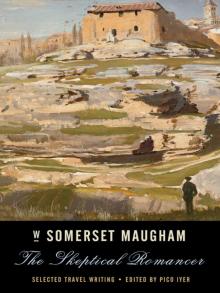 The Skeptical Romancer: Selected Travel Writing
The Skeptical Romancer: Selected Travel Writing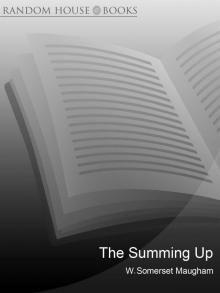 The Summing Up
The Summing Up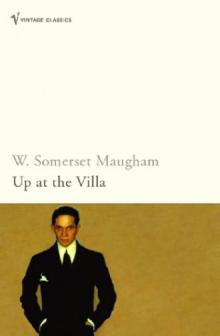 Up at the Villa
Up at the Villa The Razor's Edge
The Razor's Edge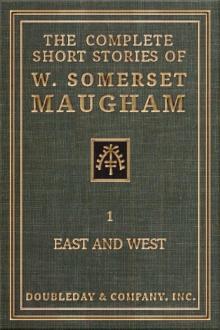 The Complete Short Stories of W. Somerset Maugham: East and West (Vol. 1 of 2))
The Complete Short Stories of W. Somerset Maugham: East and West (Vol. 1 of 2))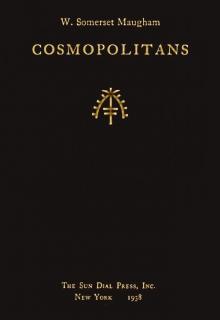 Cosmopolitans
Cosmopolitans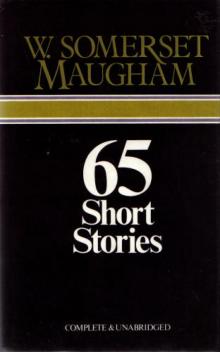 65 Short Stories
65 Short Stories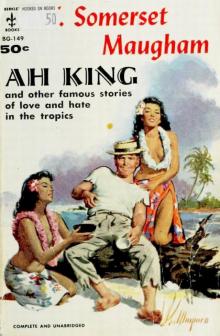 Ah King (Works of W. Somerset Maugham)
Ah King (Works of W. Somerset Maugham) Collected Short Stories: Volume 1
Collected Short Stories: Volume 1 Collected Short Stories Volume 2
Collected Short Stories Volume 2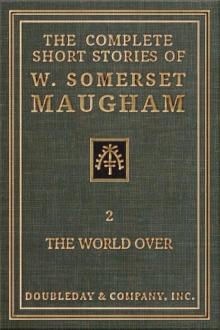 The Complete Short Stories of W. Somerset Maugham - II - The World Over
The Complete Short Stories of W. Somerset Maugham - II - The World Over Collected Short Stories Volume 4
Collected Short Stories Volume 4 Theatre
Theatre Short Stories
Short Stories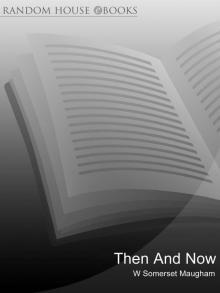 Then and Now
Then and Now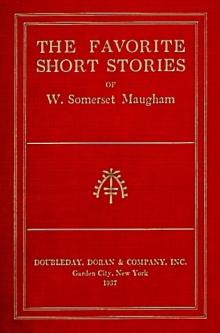 The Favorite Short Stories of W. Somerset Maugham
The Favorite Short Stories of W. Somerset Maugham Of Human Bondage
Of Human Bondage The Magician
The Magician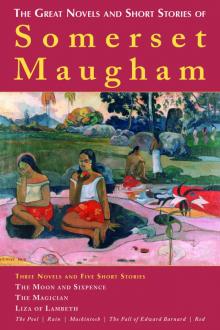 The Great Exotic Novels and Short Stories of Somerset Maugham
The Great Exotic Novels and Short Stories of Somerset Maugham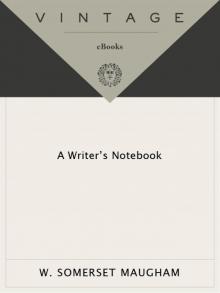 A Writer's Notebook
A Writer's Notebook Christmas Holiday
Christmas Holiday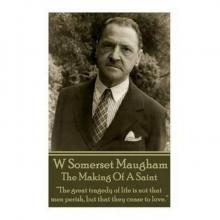 The Making of a Saint
The Making of a Saint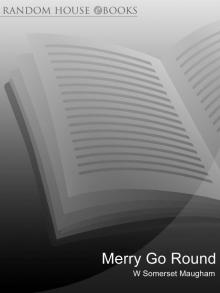 Merry Go Round
Merry Go Round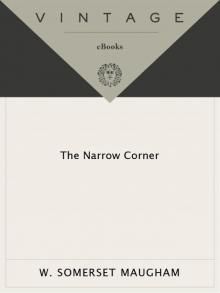 The Narrow Corner
The Narrow Corner Collected Short Stories Volume 3
Collected Short Stories Volume 3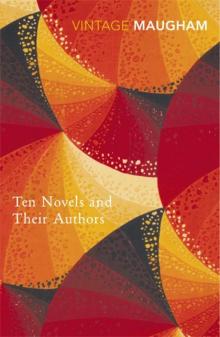 Ten Novels and Their Authors
Ten Novels and Their Authors Ashenden
Ashenden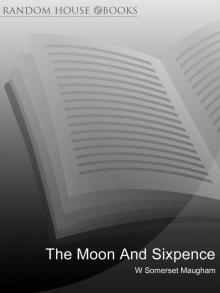 The Moon and Sixpence
The Moon and Sixpence Cakes and Ale
Cakes and Ale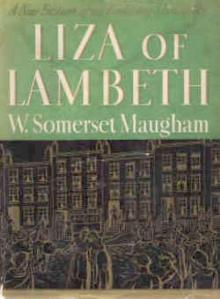 Liza of Lambeth
Liza of Lambeth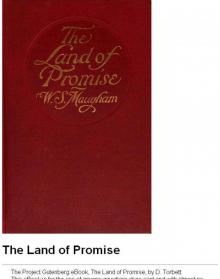 The Land of Promise: A Comedy in Four Acts (1922)
The Land of Promise: A Comedy in Four Acts (1922)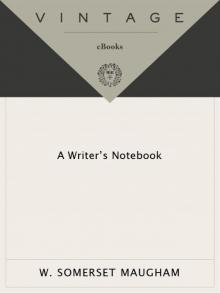 A Writer's Notebook (Vintage International)
A Writer's Notebook (Vintage International)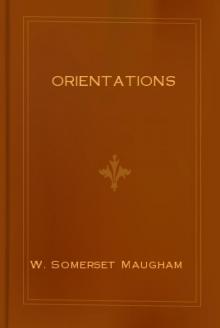 Orientations
Orientations Selected Masterpieces
Selected Masterpieces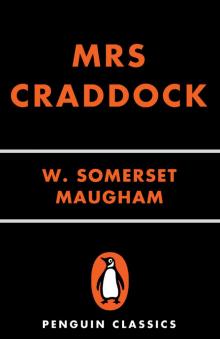 Mrs Craddock
Mrs Craddock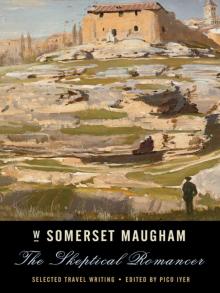 The Skeptical Romancer
The Skeptical Romancer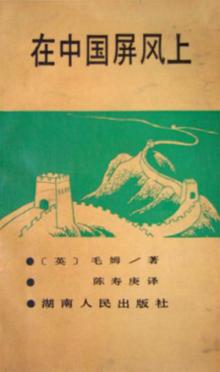 On a Chinese Screen
On a Chinese Screen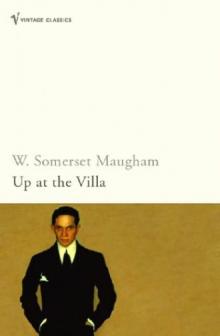 (1941) Up at the Villa
(1941) Up at the Villa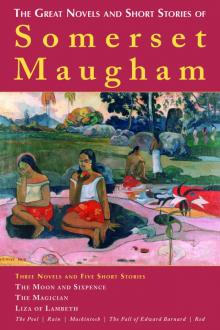 The Great Novels and Short Stories of Somerset Maugham
The Great Novels and Short Stories of Somerset Maugham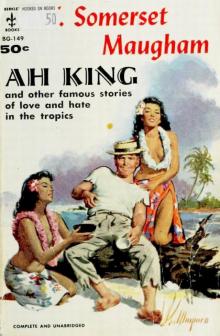 Ah King
Ah King The Explorer
The Explorer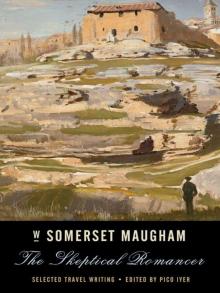 The Skeptical Romancer: Selected Travel Writing (Vintage Departures)
The Skeptical Romancer: Selected Travel Writing (Vintage Departures)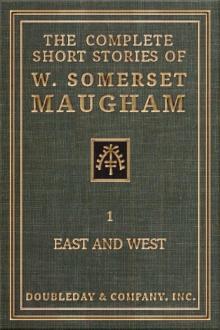 The Complete Short Stories of W. Somerset Maugham - I - East and West
The Complete Short Stories of W. Somerset Maugham - I - East and West